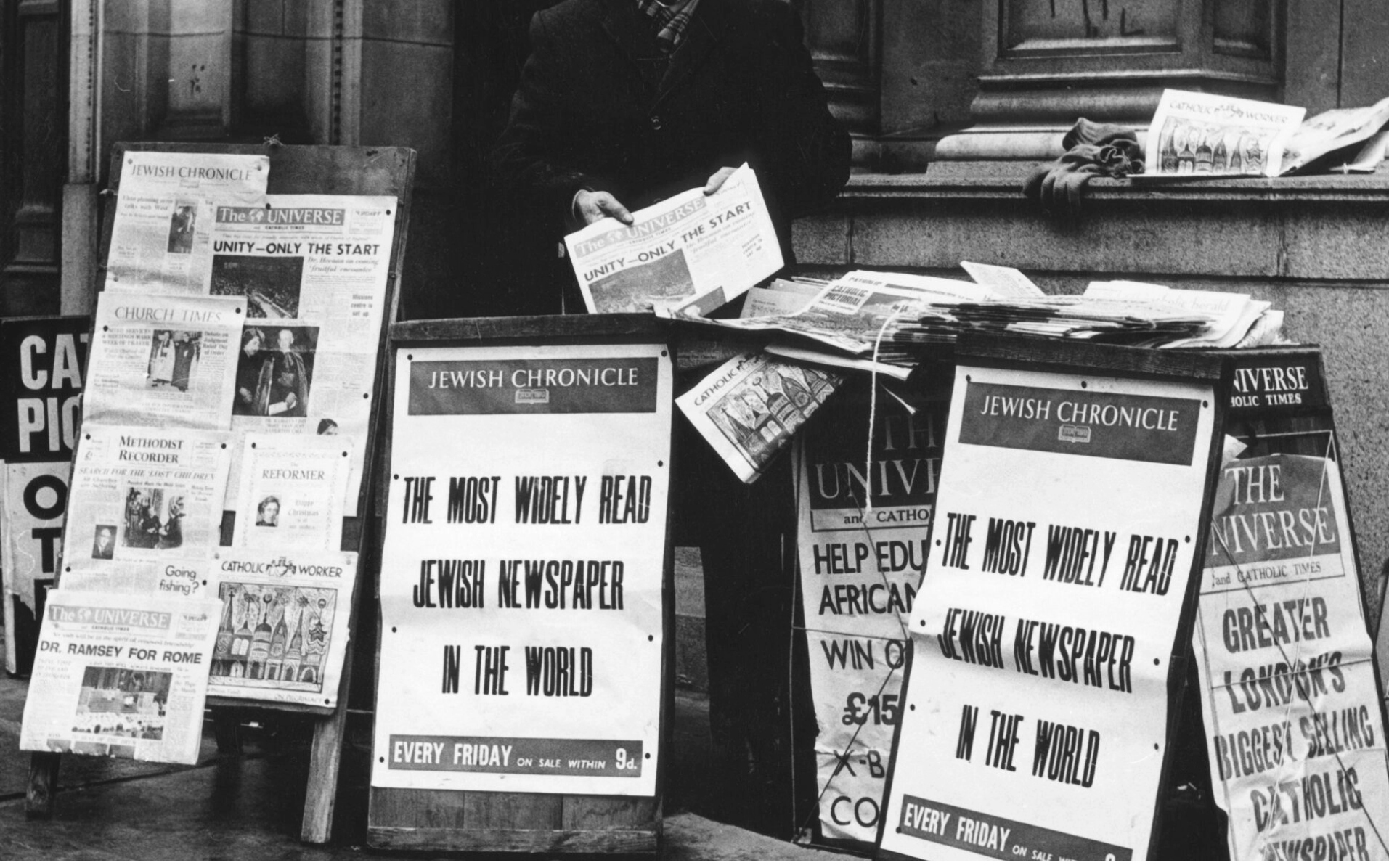Several prominent columnists have resigned from the world’s oldest Jewish newspaper amid allegations that the paper ran fabricated news stories that advanced the Israeli government’s narratives about the war in Gaza.
The London Jewish Chronicle deleted nine stories under the byline Elon Perry after criticism that his stories, which were based on anonymous sourcing in Israeli “intelligence,” could not be verified. The newspaper also cut ties with Perry, saying in a statement on Friday that it was “not satisfied with some of his claims” about his record.
“The Jewish Chronicle maintains the highest journalistic standards in a highly contested information landscape and we deeply regret the chain of events that led to this point,” the paper said. “We apologise to our loyal readers and have reviewed our internal processes so that this will not be repeated.”
Meanwhile, Perry — who is Israeli and who published under an assumed name — lashed out at Israeli reporter from the news channel that revealed his real identity.
“You are a monster, a maniac, a liar. I don’t understand who created you,” he said in a phone call that the reporter recorded and published. “I wish Hamas would kill you, you are unnecessary in Israeli society.”
The scandal embroiling the London Jewish Chronicle could ripple more widely, as the German newspaper BILD is also facing criticism over similar stories that it published.
It is also renewing questions about the current leadership and direction of the Chronicle, which first launched in 1841. Four years ago, a consortium of buyers led by a journalist-turned-political advisor rescued the newspaper from possible closure. Since then, the newspaper has become more right-wing and pro-Israel, and its critics have raised questions about whether its opaque ownership masks a political agenda.
The latest twist appeared for a short time like a reporting coup, as the newspaper stood out for publishing unique scoops about the war in Gaza. Perry reported that IDF soldiers had lived undercover in Gaza for weeks before rescuing Noa Argamani and two other hostages in June, in reporting that no other outlet has matched.
He also published a story suggesting that Hamas leader Yahya Sinwar was planning to sneak out of Gaza and head for Iran with some of the remaining Israeli hostages via the Philadelphi corridor.
Each of the stories bolstered the Israeli government’s claim that it needs to keep fighting Hamas and that military pressure was succeeding in dismantling the terror group and returning the hostages.
Israel’s insistence on maintaining an IDF presence in the Philadelphi corridor has reportedly been a sticking point in negotiations for a ceasefire deal that would include the return of Israeli hostages held in Gaza.
Perry’s Sinwar story, which seemed to support statements made the day before by Israeli Prime Minister Benjamin Netanyahu, was repeated in major Israeli media outlets.
The IDF denied the report and an intelligence source told the Israeli journalist Ronen Bergman that the Sinwar story was a “wild invention.”
A similar pattern played out with a story reported in the German tabloid BILD on Sept. 6, allegedly based on a secret document the IDF found on Sinwar’s personal computer in Gaza. Netanyahu cited the BILD report in a briefing days later, saying it showed that Israelis calling for a ceasefire deal were doing just what Sinwar wanted.
The IDF said the document did not come from Sinwar’s computer. It is now is reportedly investigating the sources of any leaks and fabrications behind the stories by Perry and BILD.
The Chronicle has not explained how Perry came to author stories that it published nor offered details about how it plans to change its editorial practices.
The newspaper confirmed that Perry did serve in the IDF but said it was unable to prove claims that had appeared on his website that he was a professsor at Tel Aviv University for 15 years and that he had served as a commando soldier during Operation Entebbe in 1976. His two books are both self-published.
According to the Guardian, Perry said he had been subjected to a “witch-hunt … caused by jealousy from Israeli journalists and outlets who could not obtain the details that I managed to.”
The mess has led to the resignation of several prominent columnists: David Baddiel, Jonathan Freedland, David Aaronovitch and Hadley Freeman.
“I’m immensely grateful for all the support I’ve had from the editors during my time there, and enjoyed writing for it enormously,” Freeman tweeted on Sunday. “But recent events have made it impossible for me to stay.”
Freedland, who followed his father as a Chronicle columnist, said he had stuck with the paper during its recent shift because of his family’s long affiliation.
“The latest scandal brings great disgrace on the paper — publishing fabricated articles and showing only the thinnest form of contrition — but it is only the latest,” Freedland tweeted. “Too often, the JC reads like a partisan, ideological instrument, its judgments political rather than journalistic.”
Freedland said he believed the newspaper’s opaque ownership prevented “real accountability.”
“I hope one day to return to the JC. But that can only happen when the JC returns to its own best traditions,” Freedland wrote. “For now, and with the heaviest of hearts, I need to break my connection with it — because I no longer recognise it.”
On Sunday, the Chronicle’s editor, Jake Wallis Simons, said he hoped the columnists would soon return.
“Obviously it’s every newspaper editor’s worst nightmare to be deceived by a journalist,” tweeted Simons, who has pilloried other British media over their coverage of the Israel-Hamas war.
“I understand why some columnists have decided to step back from the paper. I am grateful for their contributions and hope that, in time, some of them will feel able to return,” he added. “I take full responsibility for the mistakes that have been made and I will take equal responsibility for the task of making sure nothing like this can happen again.”
Support the Jewish Telegraphic Agency
Help ensure Jewish news remains accessible to all. Your donation to the Jewish Telegraphic Agency powers the trusted journalism that has connected Jewish communities worldwide for more than 100 years. With your help, JR can continue to deliver vital news and insights. Donate today.




